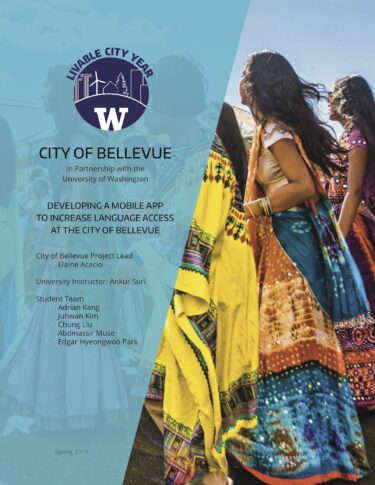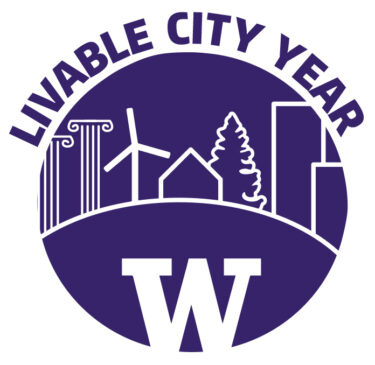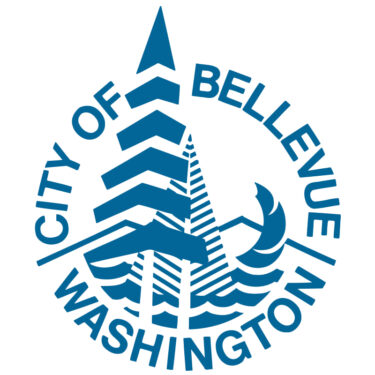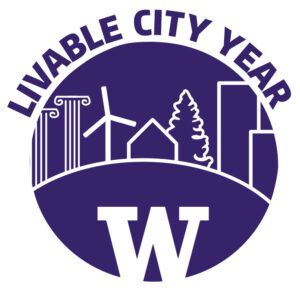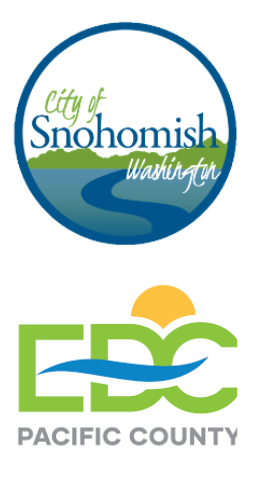Developing a Mobile App to Increase Language Access at the City of Bellevue
2018-2019 Livable City Year – Bellevue
City Project Lead: Elaine Acacio, City Manager’s Office
UW Instructor: Ankur Suri, Information Technology and Systems, UW Tacoma
Course: T INFO 497, Internship in Information Technology and Systems
Project description:
Bellevue’s residents represent a rich tapestry of races, cultures, and languages. About 42% of Bellevue’s population in 2015 spoke a language other than English at home, compared to King County 27%, Seattle 21%, the state of Washington 19%, and the US 22%. The Bellevue School District reported having 95 different languages spoken by children enrolled in the 2016– 2017 school year.
This rich language diversity has made language access a high priority for the City of Bellevue, not only because of its federal mandate under Title VI of the Civil Rights Act, but because language access and information are integral components of exceptional customer service and social justice.
In the Fall of 2018, the City of Bellevue asked the University of Washington (UW) to create an in-house software application that could help the City of Bellevue’s workforce quickly sift through a database of language access resources and identify the specific resources appropriate for their clients. Through the UW Livable City Year program, Elaine Acacio in the City Manager’s Office was introduced to Professor Ankur Suri in the School of Engineering and Technology at UW Tacoma. Professor Suri assigned a team of five undergraduate student interns to take on this applied technology challenge.
The student team began their process by meeting several times with Bellevue staff to learn about the various challenges faced by employees when trying to provide language access services to residents. The students conducted one-on-one meetings with City staff who work at the Service First desk, Blayne Amson, ADA/Title VI Administrator with the City Manager’s Office, and Mark Heilman, who oversees the Neighborhood Outreach division. The students also met with staff from the departments of Finance and Asset Management, Community Development, and IT, to further understand the nuances of the problem.
Broadly speaking, the categories of language access resources at Bellevue include:
- Bilingual City staff who are willing to provide interpreting or translation services for small jobs on a volunteer basis
- Bilingual staff who serve as cultural navigators at Mini City Hall in Crossroads Mall who can provide in-person interpretation
- Devices that provide simultaneous interpretation at public meetings
- Telephonic interpretation
- Third-party professional interpreters or translators
Under the direction of Professor Suri, the students worked in two teams to develop versions of the software application for iOS and Android. Throughout the project, students met frequently with City staff to refine the design and test the prototypes. The end product is a mobile app that asks the user a series of questions about the type of services needed by the client and then guides them to the appropriate resources.
It is hoped that this project will enhance clarity for the City’s workforce as they provide and use language access resources while serving Bellevue’s diverse community. For next steps, the students recommend that Bellevue adapt this app to a webpage for internal use so that employees can find information about language access services from their laptops and desktop computers. Ultimately, it is hoped that a similar site could be made available to the public.
Part of the 2018-2019 Livable City Year partnership between the University of Washington and the City of Bellevue.
See all Livable City Year projects in Bellevue that UW students and faculty worked on during the year-long partnership.
